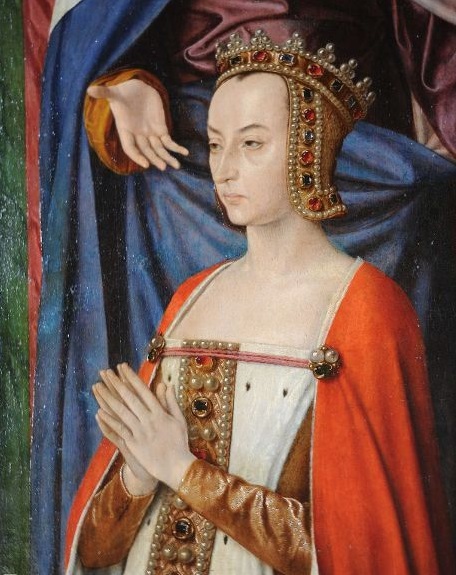
On the 3rd of November 1473, the 12-year-old Princess Anne, the eldest surviving daughter of King Louis XI of France and his wife, Charlotte de Savoy, married the 34-year-old Pierre de Bourbon. Pierre’s older brother, Duke Jean de Bourbon, ceded the title of ‘Seigneur de Beaujeu’ to Pierre, and the couple together ruled the fiefdom of Beaujolais. Anne was never a stunning beauty: dark-haired and hazel-eyed, she had a high forehead, thin lips, an austere oval countenance, her bearing imperial and her back always kept straight wherever she appeared. Her bridegroom was not particularly handsome either, being quite average in his appearance, although very smart.
Anne did not love her husband, but royal marriage were rarely based on love, and she always respected her father’s will, obeying Louis XI’s wishes without any question. After her wedding, Anne spent much time in the company of her royal father who preferred to reside at Château de Plessis-lèz-Tours, situated in the town of La Riche in the Loire Valley. As she helped her father handle state affairs, Louise commended calling her proudly ‘the least foolish woman in France.’ Impressed by Anne’s intelligence and by Pierre’s loyalty to her and to him, Louis made them co-regents during the minority of his heir, Charles VIII. After Louis XI’s demise, Pierre and Anne successfully ruled France and dealt with rebellious lords during the Mad War (la Guerre folle) of 1485-1488, including two princes of the blood – Louis d’Orléans and Count Charles d’Angoulême. Anne and Pierre had only one surviving child – the sickly Suzanne de Bourbon.
On the 3rd of November 1492, the Peace of Étaples was signed in Étaples, located in northern France, between King Henry VII of England and King Charles VIII of France. It was one of the last achievements of Anne de France, also known as Anne de Beaujeu, for her younger brother, Charles, ceased the regency of Anne and Pierre de Bourbon, which had lasted during his minority from 1483 until 1491. Nonetheless, it was Anne who negotiated the terms of the treaty with the English to stop an English invasion of France launched by Henry VII of England.

Many people do not know that although the Hundred Years’ War was over, the first Tudor monarch also invaded France. Why did Henry Tudor, who was overwhelmed with problems at home to strengthen the legitimacy of his shaky claim to the English throne, attack France? The reason is that Anne and Pierre both supported the pretender Perkin Warbeck, just as many other European rulers did. Perhaps Anne and Pierre acted so because of England’s prospective alliance with Spain and Burgundy against France, or maybe for some other political reasons. In response, the English had arrived at Calais and laid soon siege to Boulogne. Therefore, Henry VIII’s siege of Boulogne of 1544 was not the first siege of this city in history perpetrated by the Tudors.
According to this document, France consented to expel Perkin Warbeck and pay to England an indemnity of £159,000. At one side, this treaty can be considered a great success for the English who could present it as a sign of their “military greatness” after their failure to conquer France. On the flip side, it was a favorable treaty for France: the English monarch accepted French control of Brittany because by this time, Anne and Pierre had ensured that the only heiress to the Duchy of Brittany, Duchess Anne, would have to marry Charles VIII. Henry had abandoned the Bretons who had welcomed him in exile during the reigns of Edward IV and Richard III of England. Yet, for Henry it was more important to neutralize the support of France to Warbeck.
The rapprochement between England and France started with this treaty and continued until the end of Henry VII’s reign, so it was a victory for both Charles VIII and his English counterpart. Unlike his father, King Henry VIII of England was hungry for lands and glory, which would result in his several invasions of France, each of them unsuccessful. Many don’t understand it, but the shadows of the Hundred Years’ War hung over France like a thick fog not for even decades, but for centuries, for the enmity with the English had a serious impact on the mentality of the French.
All images are in the public domain.
Text © 2020 Olivia Longueville





